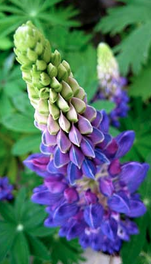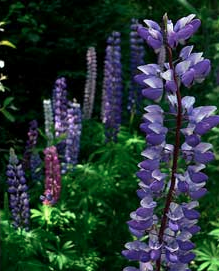 Sundial Lupine Sundial Lupine We can think of at least 180 great forest garden & perennial crops for cold climate Sweden. Want to hear about them? Over the course of the next year we will profile 5 a week on the blog. Perennial plants and crops offer a low energy, oil & resource input based foundation for future-proof agricultures. By default if an agriculture is to be called regenerative the bottom line is that it must be soil building, not soil depleting. Relentless deep tillage & poor soil husbandry (wifery?!) contributes to the majority of the 24 billion tons of topsoil lost every year on planet water. We are going to be focused on holistic polyculture grazing and perennial production at ridgedale over most of the site as this represents the most effective way to restore our degraded landscape, produce high value produce and ensure the future resource base we are managing holistically for in our decision making.  Genus Lupinus Species spp. Common Name lupine Form herb Habit clumping Origin Europe/ N. America Light sun Moisture mesic Nitrogen Yes Groundcover Yes Seed of sundial lupine can be eaten cooked. Used as a protein-rich vegetable or savoury dish in any of the ways that cooked beans are used, they can also be roasted or ground into a powder. The seed has a bitter flavour due to the presence of toxic alkaloids, it should be thoroughly leached before being cooked. Seedpods can also be cooked. The seed of many lupin species contain bitter-tasting toxic alkaloids, though there are often sweet varieties within that species that are completely wholesome. Taste is a very clear indicator. These toxic alkaloids can be leeched out of the seed by soaking it overnight and discarding the soak water. It may also be necessary to change the water once during cooking. Fungal toxins also readily invade the crushed seed and can cause chronic illness. A cold tea made from the leaves has been used to treat nausea and internal haemorrhages. Lupinus, commonly known as lupin or lupine is a genus of flowering plants in the legume family, Fabaceae. The genus includes over 200 species, with centers of diversity in North and South America. Smaller centers occur in North Africa and the Mediterranean. Seeds of various species of lupins have been used as a food for over 3000 years around the Mediterrranean (Gladstones, 1970) and for as much as 6000 years in the Andean highlands (Uauy et al., 1995), but never have they been accorded the same status as soybeans or dry peas and other pulse crops. The pearl lupin of the Andean highlands of South America, Lupinus mutabilis, known locally as tarwi or chocho, was extensively cultivated, but there seems to have been no conscious genetic improvement other than to select for larger and water-permeable seeds. Users soaked the seed in running water to remove most of the bitter alkaloids and then cooked or toasted the seeds to make them edible (Hill, 1977; Aguilera and Truer, 1978), or else boiled and dried them to make kirku (Uauy et al., 1995). However, Spanish domination led to a change in the eating habits of the indigenous peoples, and only recently has interest in using lupins as a food been renewed (Hill, 1977). The legume seeds of lupins, commonly called lupin beans, were popular with the Romans, who cultivated the plants throughout the Roman Empire; hence, common names like lupini in Romance languages. Australian Sweet Lupins (Lupinus angustifolius) are high in protein, dietary fibre and antioxidants, very low in starch, and are gluten-free. Lupins can be used to make a variety of foods both sweet and savoury including everyday meals, traditional fermented foods, baked foods and sauces. Lupin beans are commonly sold in a salty solution in jars (like olives and pickles) and can be eaten with or without the skin. Lupini dishes are most commonly found in Europe, especially in Portugal, Egypt, Greece, and Italy, and also in Brazil. In Portugal, Spain, and Spanish Harlem, they are popularly consumed with beer. In Lebanon, Jordan, Syria, Israel and Palestine, salty and chilled lupini beans are called termos and are served as part of an apéritif or a snack. The Andean lupin or tarwi (L. mutabilis) was a widespread food in the Incan Empire. Other species, such as L. albus (white lupin), L. angustifolius (narrow-leafed lupin), and L. hirsutus (blue lupin) also have edible seeds. Lupins were also used by many Native American peoples such as the Yavapai in North America. Lupins are known as altramuz in Spain and Argentina. The seeds are used for different foods, from sausages to lupin-tofu or baking-enhancing lupin flour. OUR FRIENDS AT PFAF HAVE AN AMAZING DATABASE OF SPECIES (UK BASED);UPCOMING TRAININGS @ RIDGEDALEWant to join us at this exciting farm project this summer. We hold regular international trainings, including 90hr+ PRI (Aus) & PC Assoc (UK) accredited PDC's and our unique 10 Week Internship, designed to kick start more professional designers & farmers regenerating their landscapes;
10 Week Internship beginning end April PDC 16- 31st May PDC 18th Jul- 2nd Aug 10 Week Internship beginning July PDC 27th Sep- 11 Oct
13 Comments
20/11/2020 02:04:08 am
Dear Sir/ Madam
Reply
I have been a fan of downloading series, and my favorites series happens to be lupin. I love that series. I have been watching the series with the help of <a href="https://www.makeoverarena.com/toxicwap-free-tv-series-movies-music-ebook-mobile-games-app/">toxicwap</a>. I really love the way you talked about lupin and I would be visiting your site for more interesting details. thanks alot.
Reply
Always giving us the best update, thank you for this information. check this site below for amazing article.
Reply
Wow amazing i have never seen this kind of content before it is amazing and wonderful the same time. THANKS it was really helpful. You can also check mine too:
Reply
Devvvv
3/2/2023 06:03:43 am
https://techbenzy.com/
Reply
Entertainment
3/2/2023 06:05:27 am
https://techbenzy.com/bet9ja-mobile-app-old-version/
Reply
Devvvv
3/2/2023 06:06:22 am
https://techbenzy.com/anu-wattle-login/
Reply
Thank you so much. This article is very good and i<a href="https://www.meeksguide.com/all-oneplus-phones-that-won-mkbhd-smartphone-awards/"> learned</a> a lot. I think I will share it with all my friends on<a href="https://www.meeksguide.com/instagram-sign-in-how-to-login-from-mobile-web-on-computer/"> instagram</a> so that they can enjoy reading a good article like this. Also, check out this article on<a href="https://www.meeksguide.com/the-best-phones-of-2023-the-mkbhd-smartphone-awards/"> MKBHD Smartphone Awards</a>, it is pretty good too.
Reply
Leave a Reply. |
Details
Like us on FB Below for regular updatesStay up to date with customized updates you want to receive
Upcoming coursesArchives
December 2016
Categories
All
|

 RSS Feed
RSS Feed